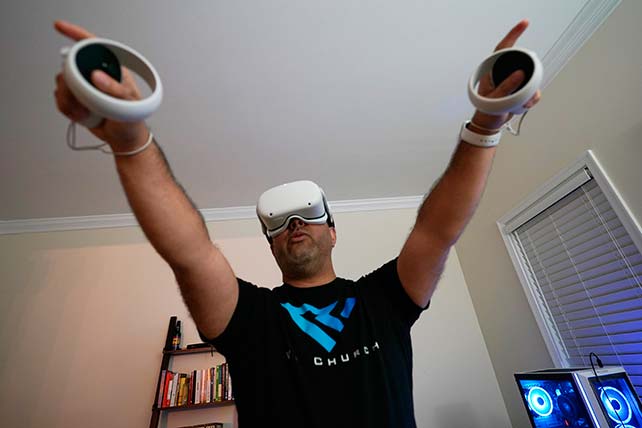Under quarantine for COVID-19 exposure, Garret Bernal and his family missed a recent Sunday church service. So he strapped on a virtual reality headset and explored what it would be like to worship in the metaverse.
Without leaving his home in Richmond, Virginia, he was soon floating in a 3D outer-space wonderland of pastures, rocky cliffs and rivers, as the avatar of a pastor guided him and others through computer-generated illustrations of Biblical passages that seemed to come to life as they prayed.
“I couldn’t have had such an immersive church experience sitting in my pew. I was able to see the scriptures in a new way,” said Bernal, a member of The Church of Jesus Christ of Latter-day Saints, widely known as the Mormon church.
He’s among many Americans — some traditionally religious, some religiously unaffiliated — who are increasingly communing spiritually through virtual reality, one of the many evolving spaces in the metaverse that have grown in popularity during the coronavirus pandemic.
Ranging from spiritual meditations in fantasy worlds to traditional Christian worship services with virtual sacraments in hyperrealistic, churchlike environments, their devotees say the experience offers a version of fellowship that’s just as genuine as what can be found at a brick-and-mortar temple.
RELATED: Pastor Craig Groeschel Leads VR Church Service Where Two People Trust in Jesus
“The most important aspect to me, which was very real, was the closer connection with God that I felt in my short time here,” Bernal said.
The service he attended was hosted by VR Church, which was founded in 2016 by D.J. Soto, a former high school teacher and pastor at a nonvirtual church. VR Church bills itself as a spiritual community existing “entirely in the metaverse to celebrate God’s love for the world.”
Soto had previously felt called to church planting, or starting new physical churches. But after discovering the VR social platform AltSpaceVR, he was awakened to the possibilities of connecting in virtual reality. He set out to create an inclusive Christian church in the metaverse, an immersive virtual world that has been gaining buzz since Facebook said last October that it would invest billions in building it out.
Attendance was scant for the first year as Soto often found himself preaching to just a handful of people at a time, most of them atheists and agnostics who were more interested in debating about faith. His congregation has since grown to about 200 people, and he has ordained other ministers remotely from his Virginia home and baptized believers who are unable to leave their houses because of illnesses.
“The future of the church is the metaverse,” Soto said. “It’s not an anti-physical thing. I don’t think the physical gatherings should go away. But in the church of 2030, the main focus is going to be your metaverse campus.”

